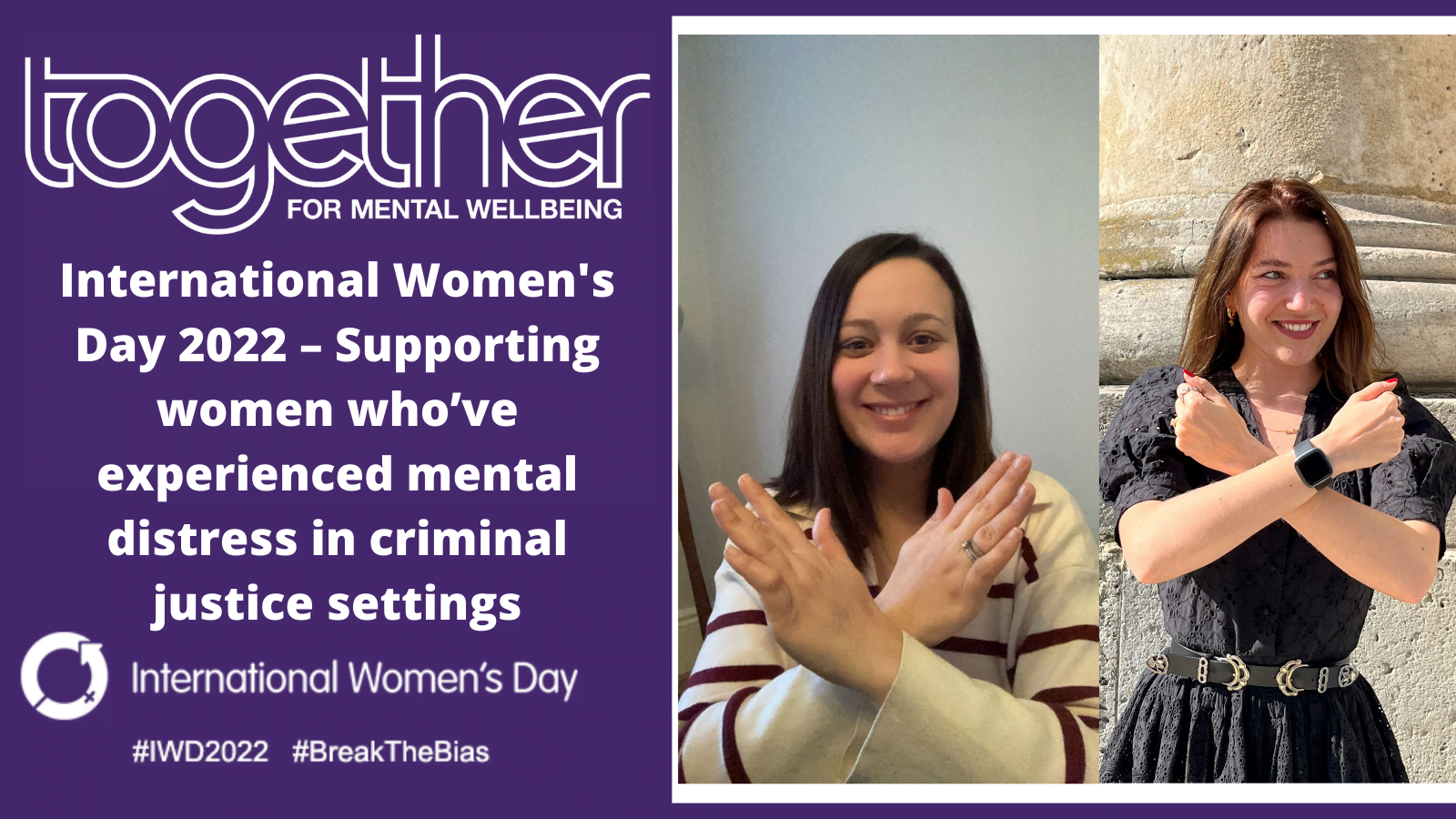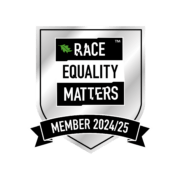International Women’s Day 2022 – Supporting women who’ve experienced mental distress in criminal justice settings

Anabel (left) and Montana take up the #BreakTheBias pose for International Women’s Day
For International Women’s Day 2022 we wanted to speak to some of our staff and volunteers at Together who work specifically supporting women who’ve experienced mental distress and come into contact with the criminal justice system. Through a series of questions we wanted to look at the inequalities that women face which can impact their mental health and ways our teams look to support them with issues that are specific to them. The theme for the day this year is #BreakTheBias and for that we wanted to show bias or prejudice women can face in accessing mental health support and how our professionals help them in criminal justice settings.
Read below for the questions and the responses from our staff and volunteers:
Could you tell us a bit about yourself, your role with Together and how you work to support women in criminal justice settings who’ve experienced mental distress?
 Anabel Cando, Deputy Operations & Development Manager – As a Deputy Operations and Development Manager my role is to manage, develop and support the governance and evaluation of our Criminal Justice services and within that I also provide strategic oversight of the Criminal Justice Women’s Strategy.
Anabel Cando, Deputy Operations & Development Manager – As a Deputy Operations and Development Manager my role is to manage, develop and support the governance and evaluation of our Criminal Justice services and within that I also provide strategic oversight of the Criminal Justice Women’s Strategy.
The Criminal Justice Directorate at Together has longstanding expertise in working with women including providing women-specialist Liaison and Diversion roles at Magistrates’ courts since 2009.
Women’s pathways into crime are often driven by the need to survive for them and their children. In recognition of this, our overall aim is to ensure women offenders have access to alternatives to custody, and engage with available support services in the community that help them build resilience and self-efficacy.
Across our Liaison and Diversion Service, we have developed specialist Women’s Practitioner roles who screen all women wherever possible. Following an assessment, our Women’s Practitioners put together a holistic care plan to address the identified needs of women. In addition, we have established good communication and working relationships with local services and agencies where practitioners play a critical role in developing and maintaining referral pathways. We also deliver specialist training to criminal justice professionals to facilitate a better understanding and awareness of the distinct needs of women in contact with criminal justice services, and assist criminal justice practitioners, professionals and members of the judiciary in becoming better equipped to recognise and respond appropriately towards them.
Carmel Pragnell, Liaison & Diversion Practitioner – Women’s Specialist – As a Liaison & Diversion Practitioner – Women’s Specialist, my role is to prioritise the needs and mental wellbeing of the women who are brought into custody. I assess their mental state during their time in court custody and inform the courts of any concerns relating to their mental health or social care needs. I then refer them to relevant support services in the community. We understand the importance of addressing the complex vulnerabilities experienced by women and supporting them to improve their lives away from the criminal justice system.
 Shelby Coulborn, Criminal Justice Community Link Worker – My Name is Shelby Coulborn and I work on the RE-CONNECT Project at Together. My role is predominantly working with women on remand in custody and within that I support women with their practical and social needs within 12 weeks of sentencing or being released from custody.
Shelby Coulborn, Criminal Justice Community Link Worker – My Name is Shelby Coulborn and I work on the RE-CONNECT Project at Together. My role is predominantly working with women on remand in custody and within that I support women with their practical and social needs within 12 weeks of sentencing or being released from custody.
In this time I arrange a first intimal meeting with the service user to discuss why they are in custody and work out any support they may require upon release to begin to develop a support plan. This process can be covered over a few meetings and that is due to the person using the service not always having much structure in the situation they are in.
We then start to discuss their mental health within custody and the support they are receiving or would like to receive through my liaison with the prison. Over the coming weeks leading up to the court date or release date, meetings will take place to discuss any alternative support they might need and to check on their wellbeing. When the service user is released from custody, we have a telephone appointment in which, we will address the support they require now they have been released. This is to make sure that the support plan fits the needs of community work. We then progress by starting the support and we tend to start with establishing the support that is most important to the service user.
Within my job role, I work to support women with mental distress by having a structured support plan with them. This way, we know what we can prioritise and what the most important thing to them is so we can move on to the smaller tasks with confidence. We can support women with liaison to many services, some of those are:
- GP Registration
- Drug and Alcohol Addiction Support
- Activity Groups
- Mother and Baby Groups
- Universal Credit/PIP
- Grants
- Support Letters to the Judge/Court
There are many more supporting factors we can help women with, the list is endless.
 Montana Cantagalli, Together National Steering Group Member – I’ve been working with Together for almost 5 years now. I started as a peer support volunteer in the criminal justice team, which I did for I think around two years. Alongside peer support, I also briefly volunteered with the mental health team at Thames Magistrates Court.
Montana Cantagalli, Together National Steering Group Member – I’ve been working with Together for almost 5 years now. I started as a peer support volunteer in the criminal justice team, which I did for I think around two years. Alongside peer support, I also briefly volunteered with the mental health team at Thames Magistrates Court.
Alongside this, I also volunteered with Solace Women’s Aid, working with victims of domestic violence. I have most often found myself previously supporting women going through criminal justice processes for domestic violence, during my volunteering role at Solace Women’s Aid. The role involved helping provide psychological relief through group work and activities together with peer support. In my time in the criminal justice team at Together I didn’t get the chance to work with women too much although I often wish I had more. Though I did get to work with a few women, the majority of the individuals I worked with were male. However, that never detracted me from a strong interest to work with women.
Do you feel there are specific issues and inequalities that women you work alongside have faced that may have contributed to the mental distress they have experienced and if so could you explain why it is important to take a trauma-informed approach to supporting them as a result?
Anabel Cando – A higher proportion of women are experiencing domestic abuse. Women in contact with our criminal justice services more often have suspected alcohol misuse, financial needs, were victims of abuse and had more mental health needs compared to men. Because of this it is really important to follow a trauma informed approach. We do that by recognising and responding to trauma, providing a safe environment, not telling their story multiple times and providing a strength based approach that provides empowerment for the women. Source – Women and the Criminal Justice System, 2019 – GOV.UK (www.gov.uk)
In 2018/19, 21% of the 85,900 adults who engaged with liaison and diversion services were female. Source – Women in the criminal justice system (prisonreformtrust.org.uk)
Carmel Pragnell – The vast majority of women within the criminal justice system have been abused by a person close to them and women in prison report a higher prevalence of issues relating to mental health, physical health, substance use, financial struggles and housing:
Data shows that a women’s history of physical, emotional, and sexual abuse does contribute to offending behaviour. As a result of the abuse women in prison have suffered in society, they are often less likely to form trusting relationships with people close to them. This is why a trauma-informed approach is vital to cultivate trusting relationships and recognise offending behaviour can be as a result of a women’s traumatic life experiences.
Shelby Coulborn – Within the criminal justice system, I would say that there are specific issues and inequalities that women I work alongside have faced that have contributed to mental distress they’ve experienced. For example, the percentage of women that are remanded and then leave custody without being charged with a conviction:
“Women in prison are more likely than men to be on remand (i.e. not convicted of an offence and therefore presumed innocent) – 45% of women entering prison in 2015 did so on remand. Less than half of women remanded and subsequently found guilty are given a prison sentence (71% of those remanded in the magistrates’ courts and 41% of those remanded by the Crown Courts did not receive a custodial sentence).”
Source – http://www.prisonreformtrust.org.uk/Portals/0/Documents/Women/whywomen.pdf
The length of a prison sentence that a women may receive once convicted can also show this. Most women that are convicted of an offence would serve around 6 months in a custodial setting:
“Women are much more likely than men to be serving short sentences. In the year to June 2016, 63% of sentenced women entering prison were serving six months or less compared to 47% of men.”
Source – http://www.prisonreformtrust.org.uk/Portals/0/Documents/Women/whywomen.pdf
This can be alarming, to think that women have children to care for and homes to stabilise and this can be taken away from them for such a short sentence. This can then have a detrimental impact on the rate of re-offending due to the women having to restart from scratch with minimal support in some areas.
Montana Cantagalli – I think it is important to look at women’s mental health in such a way where it gets you to delve deeper into thinking about the link between mental health and gender inequality. We should consider the fact that things like our social context and our environment hugely factors into our mental health. Men and women are impacted differently by socially constructed gender expectations and gendered norms and it is important to include this thought pattern when we address mental health.
Women have come far, and existing in this world as a woman is not the way it was many years ago. However, this sadly does not mean that existing as a woman does not still come with its burdens to bare. From domestic violence, career inequality and street harassment to reproductive rights and education, women still find themselves in many ways disrupted by gender inequality. If we take a minute to consider these factors, when looking at women’s mental health, we can often get a much more comprehensive view of the situation and provide the best support.
This leads me to why I can never stress enough how important it is to take a trauma informed approach to supporting women in their mental health journey. Approaching supporting a women’s mental health should include considering how navigating the world as a woman, with the trials and tribulations that come with that, could factor into their wellbeing and care. A trauma informed approach also tells us to consider the effects of traumatic experiences on the individuals’ journey to support them in the best possible way.
The theme for International Women’s Day 2022 is #BreakTheBias, do you feel there is bias women face in society that impacts their mental health or also when they look to access support and what are the ways you look to try and combat that and support them in your role?
Anabel Cando – The stigma and shame regarding being a mother or a carer when coming into contact with the criminal justice system limits women’s access to support and the understanding of their needs. That can manifest as fear of their children being taken away or concern at not being able to care for a loved one. Women specific services that provide a trauma informed approach, offering assessments and interventions that are inclusive of their needs in a holistic manner is really important.
Carmel Pragnell – Women experience gender bias in every aspect of society – inequality in the workplace, sexual harassment, domestic abuse. In the context of domestic abuse:
“1 in 4 women will suffer domestic abuse in their lifetime disproportionately to men. Suffering abuse and discrimination can lead women to offend. Over half of women in prison report having suffered domestic abuse.”
Source – http://www.prisonreformtrust.org.uk/WhatWeDo/Projectsresearch/Women
It is important to realise the impact of such trauma and understand the specific care needs of women. We refer women to women-specific services who appreciate their needs and support them in the community.
Montana Cantagalli – I was once a woman navigating the criminal justice and mental health systems. I have been that women standing nervously in front of law enforcement and mental health teams, building the courage to tell my story. My faith in these systems were low at the time and I feared the existence of those gender biases I knew would work against me.
That experience drove me to an interest in working in the criminal justice system. I wanted to be a person who, when faced with a person like me at that time, would extend the kind of understanding and compassion that I wished I had received. I wanted to radiate this understanding of the difficulties women face and to share and discuss the issues that the world around them tells them they should be silent about. I want to live in a world where no woman is afraid to have a voice for herself and is greeted with safety and understanding in the face of the criminal justice system.
Is there anything you’d like to share from your experiences of providing mental health support to women in criminal justice settings that make you feel we can #BreakTheBias and achieve a world that is diverse, equitable, and inclusive?
Anabel Cando – The thing I’d like to share from my experience providing mental health support to women is how important it is for all services to use a trauma informed approach. That should ensure women have the option of speaking to a woman and being seen by women specialist services. The use of more out of court disposals so women do not need to go through the criminal justice system would also be beneficial.
Carmel Pragnell – In the criminal justice system, we need a focus on women’s mental health and the disadvantage they face in society, which may have led them to offend. It is important to understand the reason for the women’s offending behaviour, to address the vulnerabilities and higher prevalence of mental health issues women face. By understanding that we can empower them to make their own life choices by creating more opportunities and easy access to women’s services in the community.
Shelby Coulborn – Something that I would like to share from my experiences of providing mental health support to #BreakTheBias is the need to combat stigma around women that have spent time in a custodial setting, or anyone women who has had involvement in the criminal justice system. It’s vital not to judge someone upon a crime or a mental health status or diagnosis and to take into consideration the percentage of women that have suffered trauma enforced impact within their life time:
“It is estimated that 85 percent of women in correctional settings have an early experience of physical and or sexual abuse. Other reports estimate even higher lifetime experience of traumatic events and show little difference between genders on the prevalence of trauma and abuse.”
Source – Policy Research Associates – Toward Creating a Trauma-Informed Criminal Justice System
That has a detrimental impact on a woman’s mental health and confidence within building a structured future.
Thank you to Anabel, Carmel, Shelby and Montana for taking the time to respond take part in this piece.


